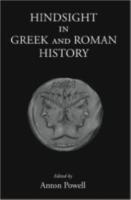
Classical Press of Wales (2013) 228pp £50 (ISBN 9781905125586)
Hindsight in ancient historiography has received considerable attention, especially of late. This highly attractive volume pursues a different, if inevitably cognate angle: the contribution that hindsight can make to our understanding of crucial moments in ancient history. Such a project does of course require a robust engagement with historiography, but considerably (and excitingly) exceeds its remit. Its agenda is not just to restate the importance of ‘what if’ history: it is predominantly, as Anton Powell makes clear in his crisp introduction, about writing history by asking ourselves what alternatives—real and perceived—were open to those who experienced certain historical events, how they went about predicting their future, and how they shaped their choices accordingly.
Christopher Pelling’s paper offers a second introduction to the whole theme that is also a most enjoyable tour de force, from Robert Harris’s Fatherland to the perils of Great Man history and the surprisingly strong explanatory power of virtual history. More specific contributions ensue: Emily Baragwanath on Herodotus’ selective avoidance of hindsight in his assessment of Athens’ contribution to the struggle against Persia; Roger Brock on the Sicilian expedition, the distinct possibility of an Athenian success, and the surprisingly fortunate consequences that defeat at that crucial junction had for Athens, as it tempered the revenge of her enemies after 404 BC; Lisa Hau explores the place in Thucydides and Xenophon of what Garry S. Morson has called ‘sideshadowing’, i.e. the authorial choice to alert the reader to the outcomes that certain events may have had in the past. Helen Roche deals with the place that hindsight has had in the historiography (ancient and modern) on the decline of Sparta after 371 BC.
The Hellenistic period is an age of change and frustration on a large geographical scale: Alexander Meeus explores the ambitions of the successors of Alexander the Great to universal hegemony, and Felix Maier discusses the weight of counterfactuals in Polybius’ narrative of the Punic Wars, which was so deeply preoccupied with the major historical changes of his time. A. Powell and Katherine Low close the proceedings with two moments of major political change and painful choices in Roman history: the 30s BC, in which the prospect of Eastern domination was regarded as more realistic than often recognised; and the days following Caligula’s death, in January AD 41, when a concerted effort to restore the Republic was made, and arguably came close to succeeding.
The volume displays the distinctive standards of elegance and exactitude to which Classical Press of Wales has accustomed its readers for the last couple of decades—as well as the idiosyncratic choice of using endnotes, even in papers where the reader would like to follow and test the unfolding of the argument by taking a close and frequent look at the references. This invaluable collection should belong in any serious Classics library, will splendidly serve the needs of research and teaching alike, and will feed the curiosity of many a general reader.
FEDERICO SANTANGELO—Newcastle University
